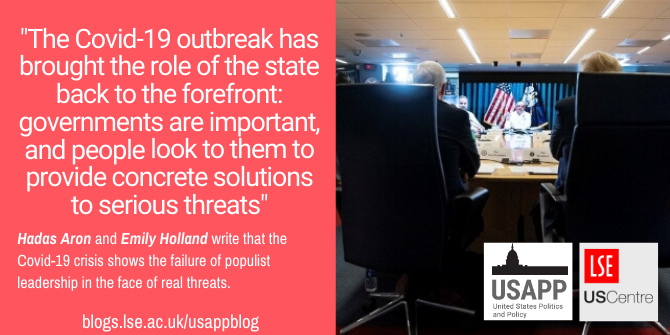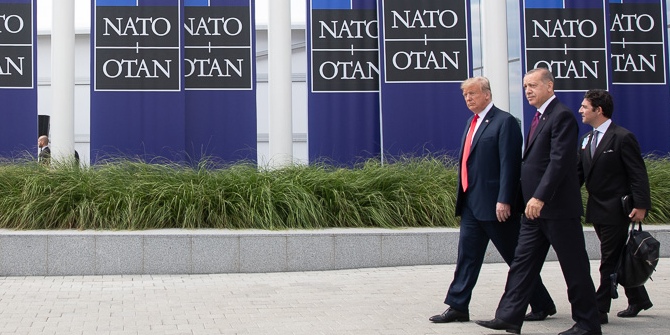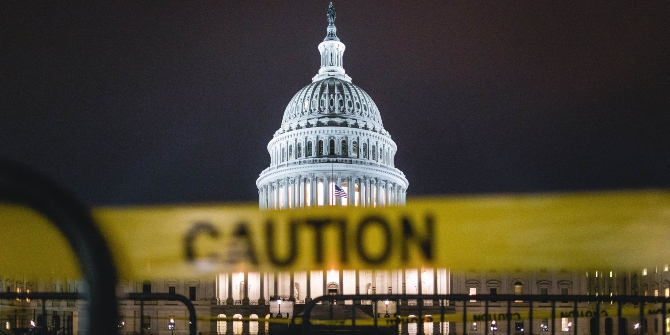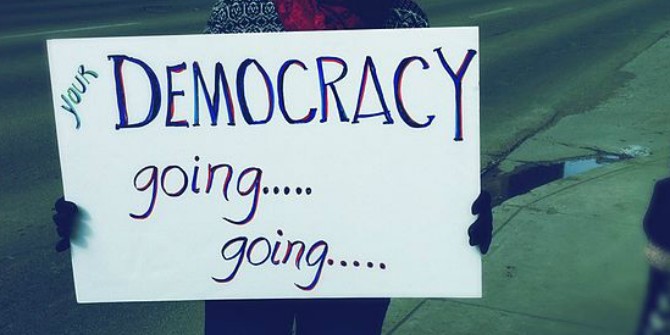
 Since the beginnings of the Covid-19 outbreak, President Trump has used the crisis to reinforce his populist rhetoric against imaginary threats such as China and immigration from Mexico. Hadas Aron and Emily Holland write that Trump’s example illustrates how populist leaders can gain support when political institutions like Congress are deadlocked. The challenge now, they argue, is for mainstream politicians to provide solid solutions to the real threats we face.
Since the beginnings of the Covid-19 outbreak, President Trump has used the crisis to reinforce his populist rhetoric against imaginary threats such as China and immigration from Mexico. Hadas Aron and Emily Holland write that Trump’s example illustrates how populist leaders can gain support when political institutions like Congress are deadlocked. The challenge now, they argue, is for mainstream politicians to provide solid solutions to the real threats we face.
As recently as March 13th, well into the Covid-19 outbreak, President Donald Trump tweeted an attack on former Vice President Joe Biden, his presumptive rival in the November general election, and suggested that the main solution to the crisis would be to close the Southern border. Populist leaders consolidate their regimes by constructing imagined threats (political rivals, out of control immigration, or nefarious international forces) and by then offering large scale vague solutions to combat them. However, populist leaders are generally less successful when they are challenged with providing effective solutions to real threats. This is not surprising because populists are anti-establishment and reject organized rule of law systems. Establishment institutions have many flaws, but they are still the basis for drafting, planning and executing policy. Without them, there is chaos. Further, most populist leaders today favor a Putin-esque strong man style of governance, but facing serious threats requires collective action. Over the past decade, populist leaders have failed to effectively handle real threats and crises: the current spread of Covid-19 is just the latest in a series of disastrous populist policy responses.
In the United States, President Trump spent the first three years of his term dismantling the very institutions and organizations designed to respond to this crisis, and during the critical first few weeks of the Covid-19 outbreak, he was busy focusing on imaginary threats (foreigners and Democrats) rather than the real one. Until recently, UK Prime Minister Boris Johnson chose to ignore the crisis altogether. Jair Bolsonaro of Brazil similarly dismisses the threat of coronavirus and continues to interact with crowds while members of his own administration have tested positive for the virus. Recently, Turkey’s health minister denied that there were any cases of Covid-19 in the country, despite evidence to the contrary and state-controlled media claimed that Turkish genes rendered most Turks immune to the virus. In Italy, the government’s response has been far more decisive, partly due to the scale of the threat within its borders, but also because the governing populist Five Star Movement is in a ruling coalition with a very traditional establishment social democratic party, the Democratic Party (PD).
The current wave of populism rose to prominence in a period with very few pressing threats, but also at a time when establishment parties lacked vision. In the United States the rise populism in the form of the Tea Party and later, Trump, occurred after the 2008 financial crisis. The most existential challenges—race relations, deep inequality and broken immigration and healthcare systems—are longstanding and not easily solved. Over the past decade a deadlocked Congress (and the mollifying forces of a booming economy) has made it difficult for politicians to offer concrete and likely difficult solutions to these threats. Under such conditions, enough Americans chose to focus on imaginary threats over real ones, electing Donald Trump in 2016. In other countries, even if the threats were very pressing, solutions were entirely unavailable. In many European states, no mainstream political actor offered concrete solutions to many years of a stagnant economy and high unemployment. Instead, this responsibility was left to the European Union. In the absence of concrete solutions to real threats, it is often more palatable to voters to mobilize on imaginary threats and pie in the sky solutions such as “making America great again” or restoring Hungary to its pre-war glory.

“President Trump Participates in a Teleconference with Governors at the Federal Emergency Management Center Headquarters” by The White House is Public Domain.
The Covid-19 outbreak has brought the role of the state back to the forefront: governments are important, and people look to them to provide concrete solutions to serious threats. In the US a poll from the past week shows that though most Americans do not trust the messaging of the president on coronavirus, they do trust public health officials and state and local government. The surge of Joe Biden in the presidential primary, viewed as the most experienced Democratic candidate in a crisis, over populist Vermont Senator Bernie Sanders shows that Americans are searching for reliable officials to guide them through almost certainly turbulent times ahead.
The lack of populist leadership displayed in the Covid-19 crisis does not necessarily signal the demise of populism. In line with the populist agenda, borders are closing all over the world in a scale not seen since WWII. Further, many leaders can use the crisis to expand state powers in a manner that further undermines democracy. In Israel, for example, the pandemic coincides with an ongoing political crisis, and Prime Minister Benjamin Netanyahu has managed to use it as an excuse to postpone his impending trial and suspend the operations of a newly elected parliament. Although populists may now be losing political capital, they will almost certainly fight back, and the imaginary threats upon which they mobilize may prove more frightening than ever in the face of a global health and economic crisis.
However, there is one lesson to draw upon: to combat populism, mainstream politicians must now provide concrete solutions to real threats. When Democrats in the 2018 midterm elections focused their message on fixing the broken healthcare system, voters responded. Now establishment politicians around the world must focus on providing practical solutions not only to the current Covid-19 crisis but also to difficult long-standing threats including vast inequality, a broken healthcare system, and immigration challenges.
Please read our comments policy before commenting.
Note: This article gives the views of the author, and not the position of USAPP – American Politics and Policy, nor of the London School of Economics.
Shortened URL for this post: https://bit.ly/3beS3QC
About the authors
 Emily Holland – United States Naval War College
Emily Holland – United States Naval War College
Emily Holland is an Assistant Professor at the Center for Naval Warfare Studies at the United States Naval War College.
 Hadas Aron – New York University
Hadas Aron – New York University
Hadas Aron is a Faculty Fellow at the Center for European and Mediterranean Studies at New York University, specializing on populism, nationalism and democracy.







Good Article, Thanks for taking the time to analyze and write on this issue. (And by the way, there was a “Third party Candidate,” whom I voted for, but didn’t win. I do not see my vote as a “vote for Trump;” neither candidate (Democratic or Republican) were viable to how I saw the Country needed to go. In a “wait and see” (suspending disbelief) attitude, for three years, giving Trump the benefit of the doubt, I’ve since withdrawn it. At this point, all I, as an Individual (and all, as a Country) can do is, (in spite of his flaws), to withold any criticism of him, supporting solely with what I agree with, (scant as it is). Until we as a Nation allow the Major Parties to negate equal attention from an (Impatial) Media, this “Trump phenomenon” will continue to occur–though future names and faces will change, future “Trump-like” candidates will forever be just outside our view, waiting for the right moment. We all suffer for it, yet little or substance is done to truly modify the present, untenable political scene.